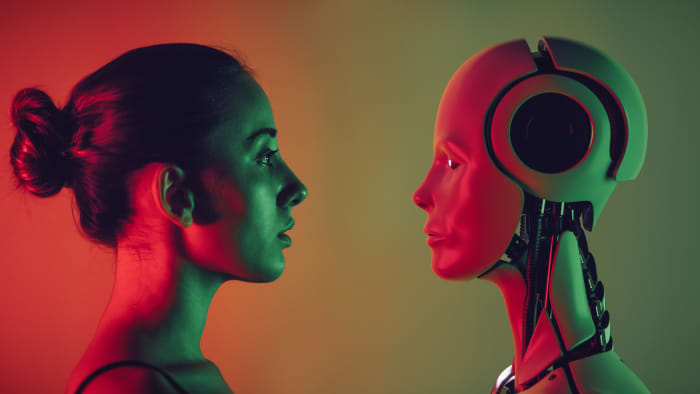Even before the meteoric rise of artificial intelligence over the past year, AI had been playing part in the hiring process for years. But there are plenty of misconceptions about how exactly AI has been used in hiring — and about what the future holds.
In recent years, AI was mainly used to scan résumés for specific keywords.
See also: Layoffs and unemployment rate stay low even as jobs market shows cracks
“It wasn’t very sophisticated,” Lindsey Zuloaga, chief data scientist at hiring technology company HireVue, told MarketWatch. “There were a lot of people trying to game that system by placing certain keywords in their résumé.”
Today, AI is used in a variety of ways in the hiring process — but many job seekers don’t understand exactly how. Here are the three biggest misconceptions about AI in hiring.
AI is replacing the interview
The interview remains an important factor in hiring, and it isn’t going away. Much of the pre-interview process, however, is being automated.
“A lot of companies will [have an applicant] do a phone screen with a recruiter,” Zuloaga said. “It’s having that whole engagement, application and assessment of the candidate automated, and then humans come into the process later. That’s typically what we are seeing. Those beginning stages, before you get to a second interview, are being automated.”
That automation can take a variety of forms, whether it’s AI chatbots that ask candidates knockout questions or language models that analyze asynchronous video interviews in which candidates record their responses to a list of questions on their own time rather than interacting with an interviewer.
At that point, once the candidate pool has been winnowed down, an actual person will come into the process.
“It’s more replacing the résumé and phone-screen stage of the interview,” Zuloaga said. “The face-to-face interview is still very relevant.”
Also read: Can AI and a supercomputer beat the markets? This is one of the hedge funds trying to find out.
AI is replacing the recruiter
Sometimes a candidate has a face-to-face interview with a member of the team that has the job opening, and sometimes with a recruiter. Because the interview itself is here to stay, that means a recruiter’s job is here to stay, too.
At this stage, AI can be used to rank candidates and to take those who don’t have certain requirements out of the running.
Instead of replacing recruiters, AI can be deployed by them to improve their performance and focus their time.
“AI is a tool for recruiters,” Zuloaga said. “And what we see is that recruiters get to spend more time on the human aspects, like talking to people, rather than doing things like looking through résumés or scheduling interviews. Just have a candidate pick a time — it frees up time to make that job more enjoyable and more interesting.”
AI decides who gets the job
“AI is being used at basically every stage of the hiring process,” Zuloaga said. “There have been a lot of problems that have been really hard to solve for decades, like résumé parsing or understanding skills and how skills are related. …. Those difficult problems, generative AI does a pretty good job at.”
But with AI being used throughout the hiring process, Zuloaga said some people think AI will also make the decision about who eventually gets a job.
“That’s not how it works,” she said. “The final decision is made by humans. [AI is] often used to rank people or evaluate [candidates] in the same way, so everybody is being evaluated in a consistent way.”
So what do people think about how AI should be used in hiring? It depends on the stage of the hiring process.
According to a 2023 study from Pew Research Center, 41% of Americans oppose using AI to review applications, while 28% are in favor of it and 30% are not sure. And when it comes to using AI to make final hiring decisions, 71% of Americans oppose that idea, while 7% think AI should be able to make such calls and 22% are not sure.







